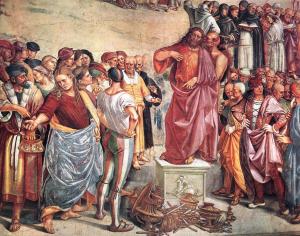
There are many goods, many virtues which we can seek after in our lives. But in doing so, we must not turn virtue against virtue, to make justice fight against justice, righteousness against righteousness, charity against charity. That is, we must not have our own pursuit of the good end up opposing the greater, holistic good by ignoring or denigrating those other goods (insofar as they are good). We can pursue social justice, finding it is what we should do, while recognizing the good of the monastic vocation, of someone called to a life of prayer in some sort of hermitage Likewise, the hermit should recognize the good of someone called to be out in public promoting justice. If, on the other hand, some hermit decries social justice, they have rejected the greater good, and their pursuit of holiness ends up being deficient. Thus, when we seek after a particular good, we must always keep in mind its particular relationship to the whole good, and never turn it around so that the particular good becomes, as it were, the whole good.
We must always remember, the source and foundation of every good is God himself, so that when we pursue some particular good, we must not ignore the expectations of God as they relate to our actions. And as those expectations are founded on the two-fold path of love, we must always have the two great commandments of loving God and our neighbor as ourselves at the forefront of what we do. If we find reasons to ignore or excuse these two commands in the pursuance of some lesser good, we know that we have rejected the good and seek after what can be conventionally be said to be evil. The good which we do will not be the good which we should be doing, and indeed, can get in the way of that greater good as we use that good to reject the greater good.
This is important for us to remember, so that when we find ourselves tempted, we do not give into temptation merely because some particular good is being offered to us. If we take what is offered, at the expense of the greater good, we cannot and must not try to justify ourselves because of that good which we obtained. For that good is hollow as it is cut off from the greater good. Certainly, if we see the error of our ways, we can take the good which we have obtained, and bring it back into the greater good which we have ignored, but often, to do that properly, we must first look after and see the good which we have rejected and properly pursue it, lest we find ourselves giving in to the same temptation as before, indeed, returning to our old ways, pursuing the very same limited good which got us into trouble in the first place.
The temptation of Jesus in the desert makes sense when we understand it was the temptation to obtain some particular desire, some particular good, apart from the way the good should be attained (which is in accord with the fullness of the good). Thus, he was tempted to use his power to create food to eat, food which certainly would have been good for him, but it would have come at a cost, since he would have used his divine power in an inappropriate manner. After being tempted to show his authority over angels, he finally was tempted to possess the world as a tyrant, and in doing so, follow the tyranny of the devil, which would be indicated by bowing down to Satan, which of course, Jesus would not do:
Again, the devil took him to a very high mountain, and showed him all the kingdoms of the world and the glory of them; and he said to him, “All these I will give you, if you will fall down and worship me.” Then Jesus said to him, “Begone, Satan! for it is written, `You shall worship the Lord your God and him only shall you serve” (Matt. 4:8-10 RSV).
In each of these temptations, Jesus would have received something good, but it would have been at the expense of the greater good. He would have had to go against his own kenotic love and embrace power in order to attain the good which he desired. That would have gone his mission which was to save the world, not through force, not through divine command, but through the greater good found in love. He could have made food for himself, he could have commanded the powers that be, the angels, to help him, and he could have taken over the world as an earthly king. For each temptation, he could have obtained some good, but he would have lost the good which he followed, the good which is found in his divine love, the good which led to be with his creation and interact with it in his love. Love desires love, not some obedience to power. Love gives the beloved freedom.
We, too, find ourselves constantly tempted by various goods, by various things which would certainly be good if they are gained justly. But we often try to find them and attain them in ways which are not good, in ways in which we sacrifice the greater, holistic good, for the sake of some lesser form of the good. It can be something important which we do this for, but if we do not understand the holistic nature of the good, and the need for our actions to follow after the good in such a way as not to sacrifice the fullness of the good for the sake of a particular good, we will likely accept evil for the sake of that good. This is how evil entices us. This is how injustice reigns. We try to justify ourselves due to the good which we hold onto, but there is no true justice involved. And eventually, we end up sacrificing the good which we say we wanted, because evil, in its nature, corrupts us and has us look for and accept lesser and lesser goods once we give in to its ways.
Vladimir Solovyov, understanding this, put forward a story of the Anti-Christ in his work, War, Progress and the End of Human History; in it, the Anti-Christ is shown capable of perverting Christians by offering them, at a world-wide council he convened for them, various particular goods which they desired:
The Emperor, standing by the throne and stretching forward his hand with an air of majestic benevolence, proclaimed in a sonorous and pleasing voice: “Christians of all sects! My beloved subjects, brothers and sisters! From the beginning of my reign, which the Most High blessed with such wonderful and glorious deeds, I have had no cause to be dissatisfied with you. You have always performed your duties true to your faith and conscience. But this is not enough for me. My sincere love for you, my blessed brothers and sisters, thirsts for reciprocation. I wish you to recognize in me your true leader in every enterprise undertaken for the well-being of humanity, not merely out of your sense of duty but mainly out of your heartfelt love for me. Sn now, beside what I generally do for all, I am about to show you special benevolence. Christians! What can I give you, not as my subjects, but as my coreligionists, my brothers and sisters! Christians! Tell me, what is the most precious thing for you in Christianity, so that I may direct my efforts to that end?”[1]
The Pope, it was said, no longer held residence in Rome. Catholics desired for the Pope once again to be in Rome, to once again exercise his power and authority there. The Anti-Christ offered this to the Catholics, if only they would bow down to him:
“In return for this, Catholic brothers and sisters, I wish to receive from you only your inner heartfelt recognition of myself as your sole protector and patron. Let those here who recognize me in their hearts and conscience as their sole protector and patron come up to this side!” Here he pointed to all the empty seats on the platform. And instantly, nearly all the princes of the Catholic Church, cardinals and bishops, the greater part of the laypeople and over half the monks, shout in exultation, “Gratias agimus! Domine! Salvum fac magnum imperatorem!” rose to the platform, and, humbly bowing their heads to the Emperor, took their seats. Below, however, in the middle of the hall, straight and immovable, like a marble statue, still in his seat sat Pope Peter II. All those who had surrounded him were now on the platform. But the diminished crowd of monks and laypeople who remained below moved nearer and closed in a dense cloud around him. And one could hear the subdued mutter issuing from them: “non praevalebunt, non praevalebunt portae inferni.” [2]
Solovyov’s Anti-Christ offered Protestants and Orthodox, likewise, their own hearts’ desires, and like the Catholics, a majority of them went over to the side of the Anti-Christ, while particular leaders in both groups denied him and found themselves joining the Pope of Rome in opposition to the him. The key here, of course, is not what was offered in the story itself, for the hopes and dreams of the people differ over time; the key is to recognize that Solovyov understood how evil could offer some great good so long as people bowed down to its claim of power and sovereignty.[3]Those who did so broke the two great commandments, because they bowed down and accepted evil at the expense of love; they were willing to take the good by force, and so separated themselves from Jesus who rejected that temptation when he was confronted by it.
Even when not dealing with the Anti-Christ, Christians can find themselves dealing with the spirit of the Anti-Christ and find themselves tempted to bow down to secular power for the sake of some good which they desire, ignoring and rejecting the greater good to get it. Thus, for example, many of those who desire for abortion to be ended would be willing to ignore the greater good, the way of love, the way of justice, in order for that goal to be obtained. That leaves them easily manipulated by tyrants to support them so long as the tyrant offers them some means to stop abortion (or at least limit it) by his or her use of force. They will justify themselves by the good which they see (the lessening of abortion) but they will not see that in doing so, they have sacrificed the greater good, the way of love, and therefore, their relationship with God: they will not understand they have given into the temptation of the devil due to their singular focus which ignores the fullness of the good. Then, the tyrant’s other actions, the greater evil which he promotes, will in part be on the hands of those who have accepted the temptation to promote the tyrant for the sake of ending or limiting abortion. Having given into such evil, the tyrants will use them as a force to destroy what is good and true, to erode freedom and charity and justice, giving them only one thing in return. Even that good, obtained in this manner, will not last, because of the corruption of the good which is associated with it. Abortion will never fully end by the use of force. This is why Christians must be taught to look beyond particular goods, beyond the so-called culture war and the goods suggested by that war, because the culture war is about the pursuit of particular goods at the expense of the greater good. Indeed, it can be shown to have manipulated Christians so they do not know or understand the fullness of the good which they should pursue.
Christians must say, when confronted with the temptation by some particular good, “No, I will not pursue this good in this way; rather, I will seek after them by promoting the fullness of the good, so that the proper good will be promoted and in doing so, the particular goods will find themselves established in the right way.” Thus, for example, if we want to stop abortion, we will do more than try to put a stop to it by force, we will do so by changing the situation so abortion will not be seen as being needed. But if we follow the culture war, and its particular ways of engaging the good, we will find ourselves in perpetual conflict in regards abortion, for the causes for abortion will never be brought to an end as they are not addressed and indeed, ignored.
When Christians, therefore, see someone claiming to be their friend, or savior, someone who offers them their particular desires, if only they are loyal to him or her, they should run far away, because such a person will only lead them down the path to hell. For by offering Christians such particular desires, particular goods, they seek to make Christians abandon Christ, to abandon the greater good which Christ expects from them. This is what we see in Solovyov’s Anti-Christ. And it is what we will see in those who follow the spirit of the Anti-Christ, even if they are not “the Anti-Christ” themselves.
[1] Vladimir Solovyov, War, Progress and the End of Human History. Trans. Alexander Bakshy. Revised Thomas R Beyer, Jr. (Hudson, NY: Lindisfarne Press, 1990), 179-180.
[2] Vladimir Solovyov, War, Progress and the End of Human History, 181.
[3] Thus, we can find many good objectives as tools which evil uses to encourage Christians away from the fullness of the good, such as, but not limited to, goods associated with abortion, religious liberty, and charitable resources. The Anti-Christ could promise to end abortion, and many would follow him, despite the fact that everything else he expects goes against the teachings of Christ. Likewise, he could offer resources for charity, but expect people to remain satisfied with systematic sins and what causes the need for people to receive charity. What is key is to find out what is expected for such goods, and to see whether or not it follows the expectations of justice or not. If it does not, then the good itself which is being offered is tainted, and must be rejected.
Stay in touch! Like A Little Bit of Nothing on Facebook.
If you liked what you read, please consider sharing it with your friends and family!













